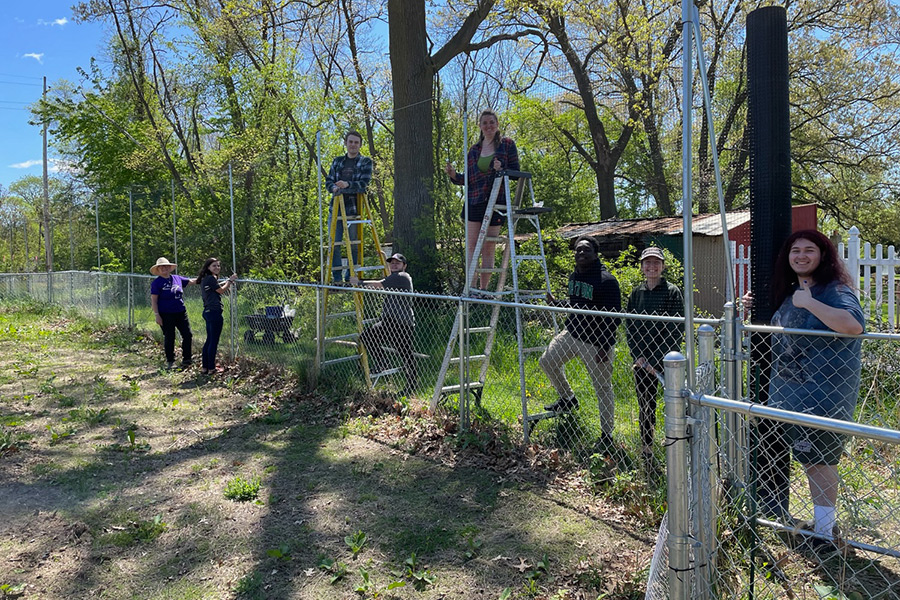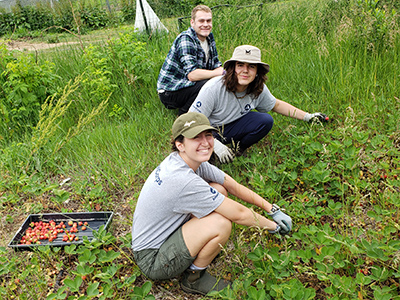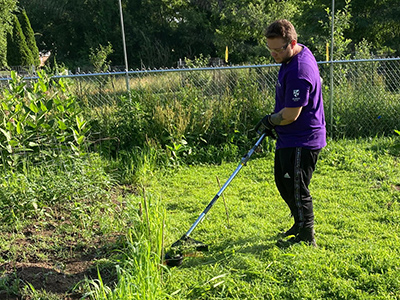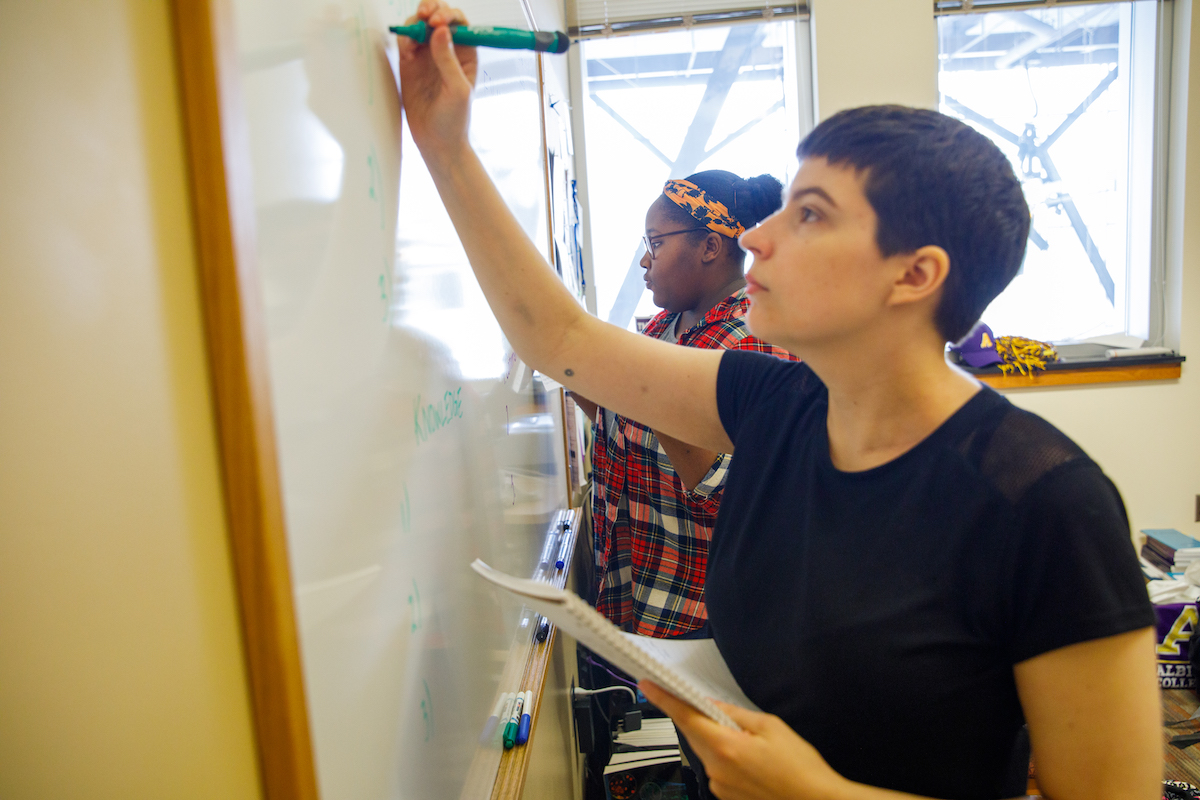CSE Interns Harvest a Bounty of Skills
Through their work this summer in the Community Gardens and the College’s Student Farm, Albion students in the Center for Sustainability and the Environment are developing pliable tools for career and life success.
August 4, 2022

Putting up the deer fence at Albion Community Gardens (left to right): Professor Trisha Franzen; Sheridan Leinbach, ’24; Justin Loukotka, ’23; AJ Bieber, ’23; Sustainability Coordinator Daisy Hall; Axel Awey, ’25; Ashlynn Reed, ’24; Octo Morales, ’25.
By Jake Weber
Ashlyn Reed, ’23, is a third-generation gardener, but her take on this family passion comes as a surprise.
“There are so many skills that make a successful gardener, and one doesn’t need to have all of them to start,” she says. “The skills I see in successful gardeners are dedication, a love of getting in the dirt and getting a bit muddy, tolerance to change and adaptability. If we all took a little bit more time to sit and watch the Earth do its best work, we can all have a bit more appreciation for what Mother Nature provides.”
Reed’s love of gardening may be unusual for a college student, but it’s bound to become more common on campus, thanks to Albion’s Center for Sustainability and the Environment and its inaugural summer internship program. Since May, six interns have been studying everything from groundhog-proof fencing to food sovereignty, while literally getting their hands dirty working alongside the Albion Community Gardens.
Highlighting the CSE’s vision as an engaged and invested member of the greater Albion community, the interns spend five mornings each week in the Community Gardens, trading sweat equity for apprenticeship-style lessons in plant care, the use of equipment and machinery, and the short- and long-term planning that is critical to successfully harvesting and distributing their crops. These lessons are then applied each afternoon at the Albion College Student Farm in the Whitehouse Nature Center (WNC), where the interns and WNC student workers are in charge.

Ashlynn Reed (bottom foreground); Riley Kunkel, ’25; and Justin Loukotka pick strawberries.
“It’s just wonderful to have the young energy,” says Dr. Trisha Franzen, professor of women’s, gender and sexuality studies and a Community Gardens founder and leader. Along with the never-ending weeding and labor-intensive organic pest control (read: picking bugs off plants), Franzen notes that the interns installed 10-foot deer fencing, helped install a drip irrigation system, and happily ran the rototiller that is too heavy for many members to handle. “When it was really hot, they also agreed to start at 7 a.m. instead of 8,” Franzen recalls.
The interns’ education in the Community Gardens is likewise a group project. “People in the garden tell stories, people share history. Working at the garden has taught me more about Albion than many of the other things I’ve done,” says Franzen. “The students are getting the benefit of all that wisdom, about gardening and Albion and so many other things.”
With Franzen, the interns also attend meetings of the Albion Community Gardens board, where they get a big-picture look at how Albion citizens are affected by the affordability and availability of food in the city. Through the Community Table of Albion, the students also help with food distribution, which will eventually include the vegetables they’re helping to grow.
“They’re getting to know the food system at a very local level,” Franzen adds. “When we bring food to the neighborhood, we can see what people’s needs are and think about how we best address those needs.”
Sustainability ‘Under the Hood’
“In the classroom, we teach a lot about sustainability and preserving the environment, but we often don’t act very locally, says Dr. Thom Wilch, CSE faculty director and professor in the Department of Earth and Environment. “We’re trying to connect what the students are learning with the operations of the College.”
To that end, Albion’s Facilities Operations and Grounds teams as well as dining services provider Metz are playing a role in the internships, giving students an “under the hood” look at their sustainability-related activity. The interns have also visited several regional colleges and universities, giving them an opportunity to see what others are doing — information they can share with the contacts they now have on campus.
“It’s great to see gardens, but there’s a lot of ‘undercover’ work — like assessing energy consumption, what sort of pipes are being used, how food waste is handled,” adds Daisy Hall, CSE coordinator. “I love seeing the students’ interest sparked by the technical stuff. The College has a lot of people with great interest and knowledge, and it’s fantastic to bring those people together through the CSE.”
Growing at the Student Farm

AJ Bieber works the trimmer as part of regular garden upkeep.
The Albion College Student Farm adds a final — and integral — piece of the internship, as the place where the interns demonstrate what they’re learning. Wilch and Hall visit the farm most days, but the planning, organizing, management and work have largely been in the students’ hands.
And the growth isn’t limited to the plants.
“At the Student Farm, I definitely have learned how to better communicate and teach gardening,” says Reed, explaining that until this summer, gardening had mostly felt like a personal exercise. “This internship has allowed me to realize the community behind gardening. It takes a group to get an area as big as the Community Gardens and Student Farm completely planted and harvested. We are able to rely on each other.”
Octo Morales, ’25, is already thinking about teaching the lessons he has learned during his internship. “Gardening is an important skill seeing as the prices of food continue to rise,” he explains. “In a place like Albion, where people have more access to land, gardening and farming can be a perfect way to get some extra food and be an excellent skill to teach the younger generation.”
“The solutions for sustainability issues like climate change depend on policy and system change, and it can be hard to see how individual or even community actions have a significant impact,” says Wilch, reflecting on the new CSE internship offering. “Growing food is different, because we can see the positive impact now. Educating students to grow food and think about community food security as a sustainability and equity issue prepares them to be social changemakers in the future.”
“At the end of the day, my favorite moment has to be seeing how much progress we as a group have made,” says Morales. “It’s such an amazing thought that what I’m doing is not only good for the environment but the community as well. I couldn’t be more thankful for this experience.”
Ariel Berry contributed to this story.
